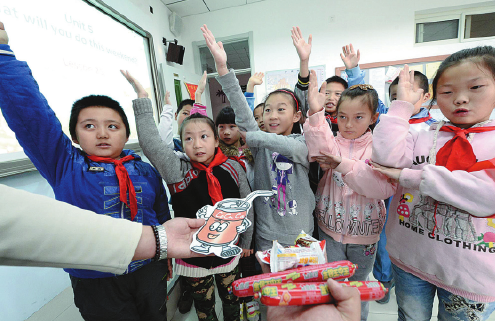If implemented, the changes would have huge repercussions for the private education sector, according to Kevin Peter, a US citizen who's been involved in English-language education in Beijing for six years.
 |
| Speaking English is the focus of a class in Beijing on Wednesday. |
"I think it's a tremendous opportunity for schools and companies that provide content and learning beyond the traditional exam areas, such as grammar, vocabulary, idioms, things like that," said Peter, who manages a privately owned school.
"From the time of its foundation, the school has never seen learning English as a goal in and of itself, but also as a means of expanding the students' worldview and helping them to become more curious and think more creatively and independently."
Strong competition
Peter said schools able to prove to parents that they provide value in several areas-developing character and independence, promoting a love of learning, engaging with, and being interested in, the opinions of others-should have nothing to worry about.
"Or perhaps I should say, less to worry about-the environment here in Beijing is very competitive, and there are a lot of challenges. However, any moves that lead to better-quality programs for learners and their families are moves in the right direction," he said.
Zhang Hong, director of the Golden Cradle Kindergarten, a Beijing-headquartered bilingual kindergarten chain, said society places too much emphasis on English skills, and that the impact of the gaokao is obvious even at the preschool level.
"Many organizations in Beijing provide English classes as a way of attracting the parents," she said. "But we insist that Chinese comes first, despite our focus on bilingual education, so the new policy won't change our syllabus."
Li Wenjun, a senior English teacher from Harbin in Heilongjiang province, said students are tested on so many linguistic technicalities in the English exams that they lose track of the key things they should master, especially crucial skills, such as reading.
"In light of the reality of the English-learning environment in China, it would be better for students to put their skills into practice by using learning materials in English, searching for useful information online, and things like that," she said. "Those are the most important techniques students should master; things that will help them to communicate in the real world, when they are admitted to colleges or universities."
One teacher at The High School Affiliated to Renmin University of China said the new policy might ease some of the pressure on English teachers in high schools.
"With less pressure from the gaokao, I could use a more practical method of teaching English, rather than getting bogged down in details such as the difference between 'which' and 'that'," said the teacher, who declined to be named.
